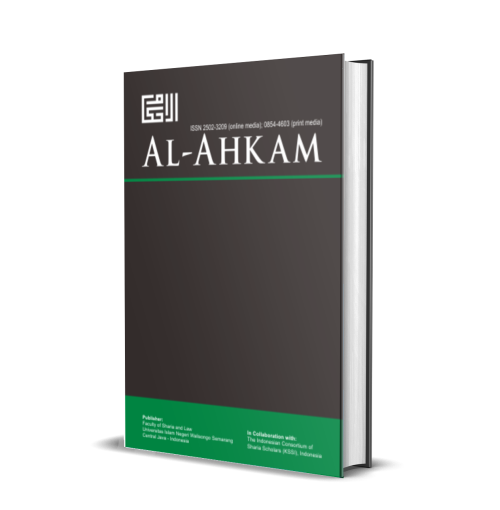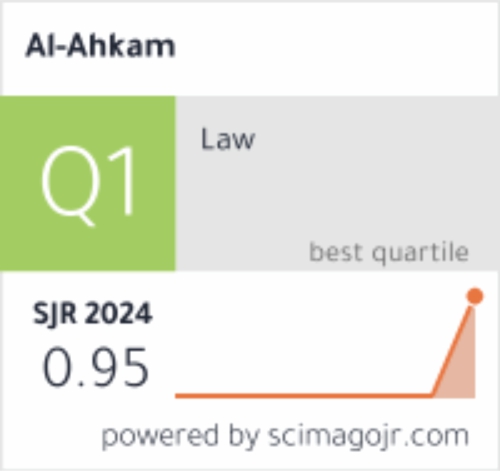REKONSTRUKSI IJTIHĀD DALAM ILMU UṢŪL AL-FIQH
DOI:
https://doi.org/10.21580/ahkam.2012.22.2.9Abstract
Al-Qur’an and Sunnah, needs of understanding and extracting optimally, so that the contents of law can be applied for the benefit of people. The way- to understand and to extract the contents in these two sources- called ijtihād. Thus, ijtihād is needed on istinbāṭ of law from many arguments of the texts (naṣ), eventhough it is qaṭ’ī in which the uṣūliyyūn have agreed that it is not the area for re-extracting to the law (ijtihādiyyah). The problem in this case is that even a qaṭ’ī argument according to the most of uṣūliyyūn has not been qaṭ’ī argument in the other uṣūliyyūn opinion. Reconstruction of ijtihād becomes an alternative, with some considerations: First, weight and tightening the requirements to become a mujtahid, which is almost impossible controlled by someone at the present time; Second, the increasing complexity of the problems faced by the ummat which is very urgent to get the solution; Third, let the period without ijtihād (vacuum of mujtahid) is contrary to the basic principles of Islamic law are always sāliḥ li kulli zamān wa makān. This paper present to discuss further about the urgency of the reconstruction of ijtihād in the challenge of modernity.
***
Al-Qur’an maupun sunnah sangat membutuhkan pemahaman dan penggalian secara optimal agar isi kandungan hukumnya dapat diterapkan bagi kemaslahatan umat. Cara untuk menggali dan mengeluarkan isi kandungan yang ada dalam kedua sumber tersebut dinamakan ijtihād. Ijtihād sangat dibutuhkan pada setiap istinbāṭ hukum dari dalil naṣ, sekalipun dalil naṣ tersebut bersifat qaṭ'ī yang oleh para uṣūliyyūn sudah disepakati tidak menjadi wilayah untuk dijitihadi lagi. Permasalahannya adalah bahwa sesuatu dalil naṣ yang sudah bersifat qaṭ'ī sekalipun oleh sebagian besar uṣūliyyūn, belum tentu dipandang qaṭ'ī oleh sebagian uṣūliyyūn yang lain. Rekonstruksi ijtihād menjadi sebuah alternatif, dengan beberapa pertimbangan: Pertama, berat dan ketatnya persyaratan-persyaratan menjadi seorang mujtahid, yang hampir tidak mungkin dikuasai oleh seseorang pada masa sekarang; Kedua, semakin kompleksnya permasalahan yang dihadapi oleh ummat yang sangat mendesak untuk mendapatkan solusi; Ketiga, membiarkan satu periode tanpa ijtihād (kevakuman mujtahid) adalah bertentangan dengan prinsip dasar hukum Islam yang selalu sāliḥ li kulli zamān wa makān. Tulisan ini hadir untuk mendiskusikan lebih jauh tentang urgensi rekonstruksi ijtihād dalam menghadapi tantangan modernitas.
***
Keywords: ijtihād, qaṭ'ī, ẓannī, uṣūl al-fiqh
Downloads
Downloads
Published
How to Cite
Issue
Section
License
By submitting an article to the journal, the author(s) agree to transfer the published article's copyright to the journal, which will act as the publisher. This means the journal will have the right to publish the article in various forms, including reprints. The journal will maintain the publishing rights to the published articles.
In line with the license, authors and third parties (readers, researchers, and others) are allowed to share and adapt the material. In addition, the material must be given appropriate credit, provided with a link to the license, and indicated if changes were made. If authors remix, transform or build upon the material, authors must distribute their contributions under the same license as the original.




